These Engaging Activities for Nursery Class children thrive in environments where learning feels like play.
Activities designed for nursery classes can be fun and educational, joyfully building fundamental skills.
Here, we’ll have activities tailored for young learners, complete with benefits, guidelines for teachers, required materials, and play instructions.

Introduction: Why Engaging Activities for Nursery Class Matters?
For nursery-age children, learning through play is essentialEngaging activities for nursery class help develop cognitive skills, creativity, fine and gross motor skills, and social skills, creating a balanced foundation for lifelong learning.
Here are ten creative and highly engaging activities for nursery classes to support young learners in a vibrant, interactive way.
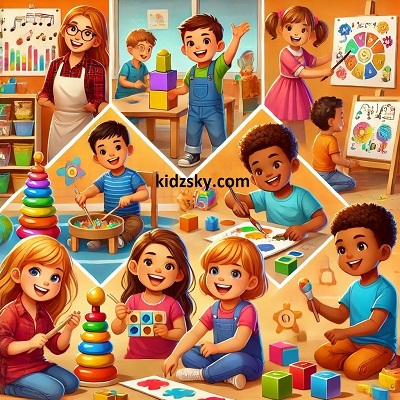
These are the Perfect 11 Activities with Benefits & Materials Required
When planning educational activities for young learners, choosing engaging tasks that are fun and beneficial for their development is essential.
Activities such as sensory play, arts and crafts, and storytelling offer various developmental benefits, like improving motor skills, boosting creativity, enhancing social interactions, and encouraging problem-solving abilities.
By including essential materials like colored paper, crayons, blocks, and sensory bins, teachers can easily set up enriching experiences that captivate children’s curiosity.
Each activity becomes an opportunity for hands-on learning, blending educational value with the excitement of discovery, making these experiences purposeful and memorable for kids.
Kids Favorite:- The Joy and Benefits of Playing in Mud for Kids: 9 Best e.g.
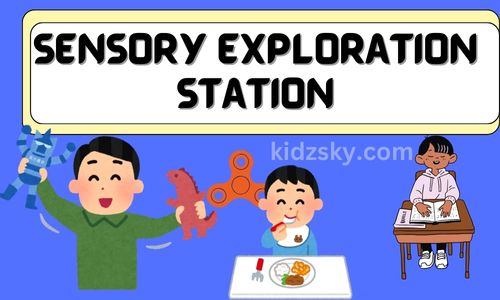
Activity 1: Sensory Exploration Station
Materials Needed:
- Sand, rice, water beads, or flour
- Small toys (like mini animals or cars)
- Plastic bins or trays
- Scoops, spoons, or small shovels
Benefits:
- Enhances sensory processing and motor skills.
- Supports language development as children describe textures.
- Builds focus and concentration.
Teacher Guidelines:
- Introduce different textures gradually to avoid overwhelming students.
- Encourage kids to describe what they feel using new vocabulary.
How to Play:
- Set up the bins with different materials.
- Let each child explore using their hands, scoops, or small shovels.
- Prompt them to find hidden items and describe the textures, shapes, and sizes.
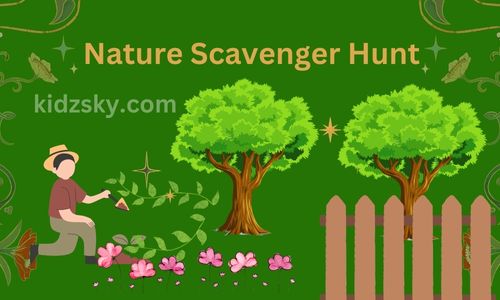
Activity 2: Nature Scavenger Hunt
Materials Needed:
- A checklist of natural items (leaves, rocks, sticks, flowers)
- Small baskets or bags
- Magnifying glasses (optional)
Benefits:
- Encourages curiosity about the natural world.
- Supports teamwork and social skills.
- Promotes physical activity and coordination.
Teacher Guidelines:
- Establish boundaries for safety during outdoor exploration.
- Assist kids in identifying different items on their checklist.
How to Play:
- Hand out checklists and baskets.
- Walk around the designated area and let children search for items on their list.
- Let them explore each item with the magnifying glass and discuss their findings.
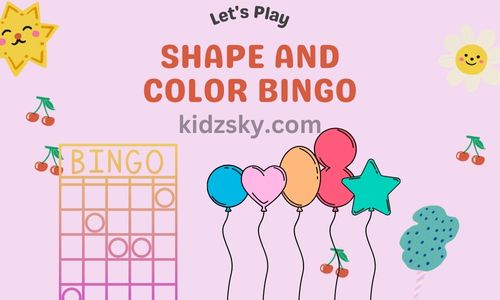
Activity 3: Shape and Color Bingo
Materials Needed:
- Bingo cards with shapes and colors
- Small counters or markers
Benefits:
- Reinforces shape and color recognition.
- Enhances attention and listening skills.
- Encourages social interaction and turn-taking.
Teacher Guidelines:
- Start with a few shapes and colors for easy identification.
- Guide children on how to cover the correct shapes on their bingo cards.
How to Play:
- Distribute bingo cards and counters.
- Call out a shape or color, and let children place a marker on the corresponding spot.
- Continue until a child completes their card and calls “Bingo!”
Guide For Kids:- The Importance of Setting Limits and Boundaries for Kids
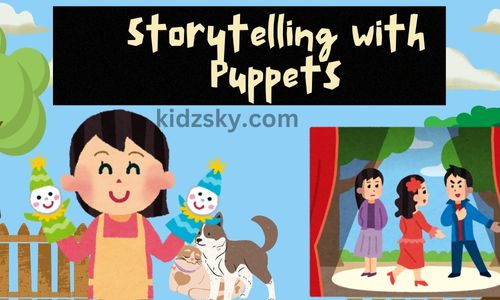
Activity 4: Storytelling with Puppets
Materials Needed:
- Finger or hand puppets
- A small “stage “area “is a puppet theater
Benefits:
- Builds language and storytelling skills.
- Boosts confidence in public speaking.
- Encourages creativity and imagination.
Teacher Guidelines:
- Demonstrate a short story with the puppets first.
- Encourage shy children to participate gradually.
How to Play:
- Allow children to choose a puppet.
- Invite them to create short stories and act them out.
- Discuss each story and prompt the children to ask questions about the characters and plot.
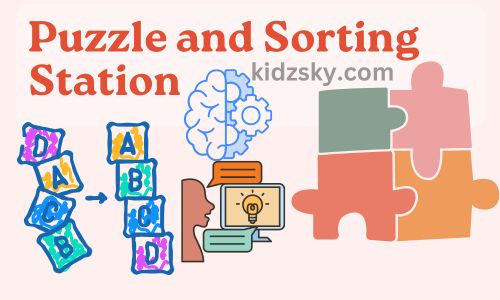
Activity 5: Puzzle and Sorting Station
Materials Needed:
- Age-appropriate puzzles
- Sorting trays or baskets
- Various small items to sort (buttons, colored blocks)
Benefits:
- Enhances problem-solving and critical thinking skills.
- Strengthens hand-eye coordination.
- Improves organizational skills.
Teacher Guidelines:
- Guide children in recognizing patterns and matching colors or shapes.
- Encourage teamwork by pairing children to solve puzzles together.
How to Play:
- Set up the puzzle and sorted items.
- Demonstrate how to sort or assemble each puzzle.
- Allow each child or group to work at their own pace and praise their accomplishments.
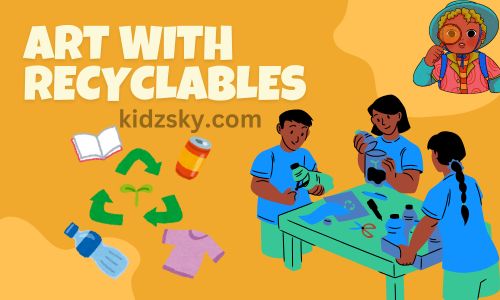
Activity 6: Art with Recyclables
Materials Needed:
- Clean recycled items (bottles, cardboard, paper rolls)
- Glue, paint, markers, scissors
Benefits:
- Encourages creativity and environmental awareness.
- Improves fine motor skills and hand-eye coordination.
- Builds awareness about recycling and sustainability.
Teacher Guidelines:
- Supervise when children are using scissors or glue.
- Encourage creativity by letting them create whatever they envision.
How to Play:
- Display different recyclable items and discuss their shapes and potential uses.
- Let children assemble their creations using glue or paint.
- Display their artwork in the classroom and discuss each creation.
Best Habits:- Teaching Kids the Value of Gratitude: 7 Best Lifelong Gift
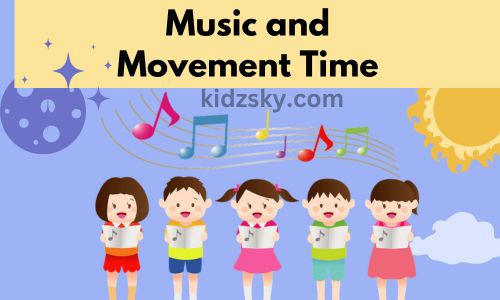
Activity 7: Music and Movement Time
Materials Needed:
- Rhythm instruments (maracas, tambourines, drums)
- Space for movement
- A playlist of child-friendly songs
Benefits:
- Improves rhythm and coordination.
- Releases energy and promotes physical fitness.
- Supports memory and listening skills.
Teacher Guidelines:
- Teach children how to handle instruments properly.
- Please encourage them to move freely but safely.
How to Play:
- Distribute instruments and play upbeat music.
- Let children follow the rhythm or move to the beat.
- Encourage kids to create their rhythm patterns or movements.
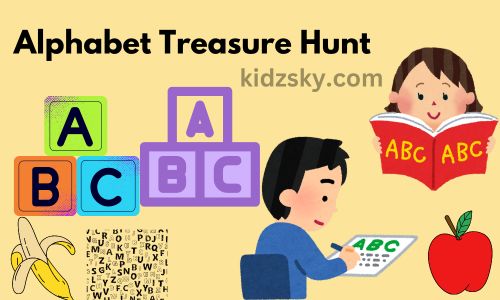
Activity 8: Alphabet Treasure Hunt
Materials Needed:
- Alphabet cards or objects with letters
- Small baskets or bags
Benefits:
- Strengthens letter recognition and vocabulary.
- Boosts observation skills.
- Creates a foundation for early literacy.
Teacher Guidelines:
- Give clear directions and assist with identifying letters if needed.
- Use this activity to discuss sounds associated with each letter.
How to Play:
- Scatter the alphabet cards around a designated area.
- Encourage children to “hunt” “or s “specific letters.
- When they find a letter, have them name it and say a word that starts with that letter.
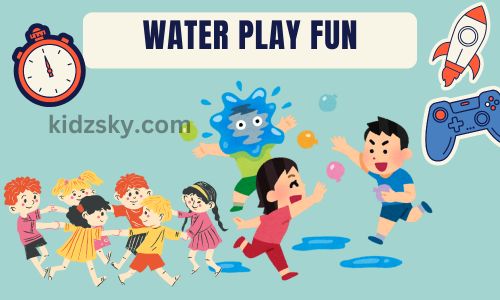
Activity 9: Water Play Fun
Materials Needed:
- Small containers or water bins
- Measuring cups, scoops, sponges
- Floating toys or boats
Benefits:
- Builds motor skills and understanding of volume.
- Teaches basic science concepts like floating and sinking.
- Provides sensory engagement.
Teacher Guidelines:
- Monitor water levels and make sure children stay safe.
- Teach them how to measure and pour using cups.
How to Play:
- Set up water bins with various objects that float or sink.
- Let children experiment with pouring, measuring, and observing.
- Encourage them to guess which objects will float or sink and see if they are correct.
For Parents:- The Benefits of Positive Parenting: Brighter Future of Child
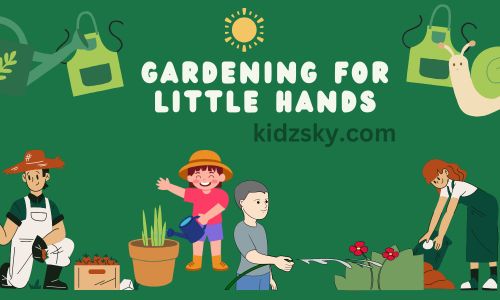
Activity 10: Gardening for Little Hands
Materials Needed:
- Small pots, soil, seeds
- Watering cans
Benefits:
- Teaches patience and responsibility.
- Connects children to nature.
- Supports understanding of plant growth.
Teacher Guidelines:
- Show children how to handle soil and seeds gently.
- Please encourage them to take turns watering the plants.
How to Play:
- Help children fill pots with soil and plant seeds.
- Please explain how to water the plants and take care of them.
- Track the growth of each plant together and let them celebrate small milestones.
Kids Activity:- The Benefits of Gardening with Kids: 7 Skills & Fun Together
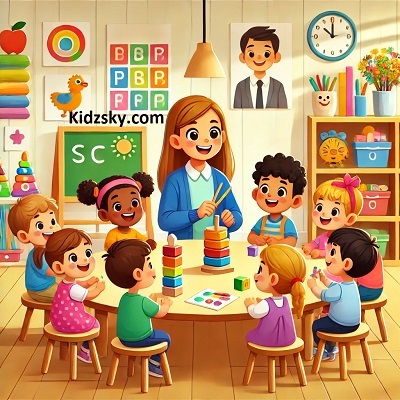
Conclusion: The Power of Engaging Activities for Nursery Class
These Engaging Activities for Nursery Class are designed to create a fun, interactive, and educational environment for young childrenFrom sensory exploration to storytelling and music, each activity strengthens critical developmental skills while keeping children engaged.
School teachers can adapt these activities to suit their class needs, providing children diverse opportunities to grow, learn, and playThrough well-planned, engaging activities for nursery class, we can create a foundation of curiosity, confidence, and a love for learning in young children.
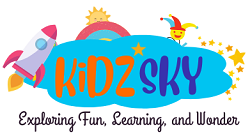



[…] For Teachers:- 11 Best Engaging Activities for Nursery Class: Learn & Play […]
[…] For Teachers:- 11 Best Engaging Activities for Nursery Class: Learn & Play […]
[…] For Teachers:- 11 Best Engaging Activities for Nursery Class: Learn & Play […]
[…] For Teachers:- 11 Best Engaging Activities for Nursery Class: Learn & Play […]
[…] For Teachers:- 11 Best Engaging Activities for Nursery Class: Learn & Play […]
[…] For Teachers:- 11 Best Engaging Activities for Nursery Class: Learn & Play […]
[…] For Teachers:- 11 Best Engaging Activities for Nursery Class: Learn & Play […]